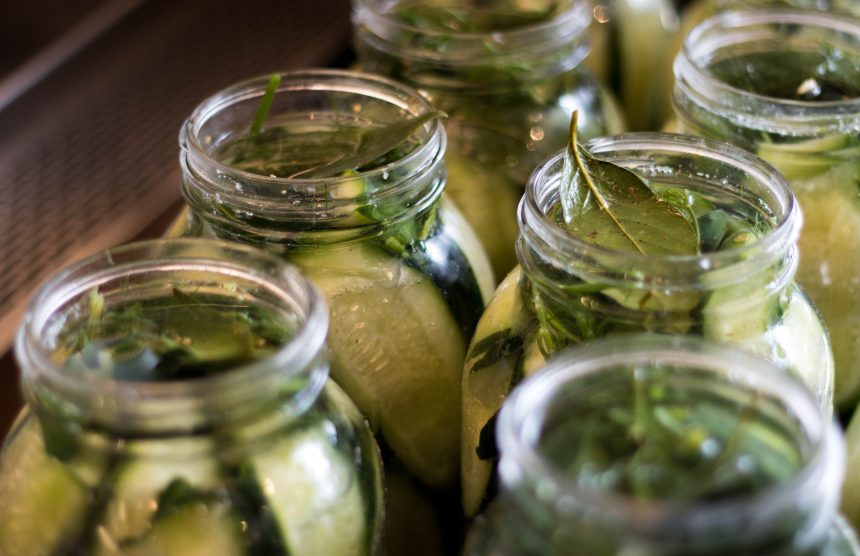Introduction
People in early civilization preserved food through drying, fermenting, salting and smoking. The act of preserving food stops the growth of microorganisms, which causes the food to spoil. Preserving food in glass jars originated when Napoleon Bonaparte requested a safe method of preserving food for his army in 1795. Later in 1810, Englishman Peter Durand discovered a way to preserve food in tin cans. Canning as we know it today in the United States was first conceived in 1912 by Thomas Kensett.
Decorations
Create harvest atmosphere by decorating with the following:
- Cream tablecloths with burlap table runners
- Baskets of various sizes filled with seasonal fruits and vegetables such as: bok–choy, Brussels sprouts, cabbage, peppers, potatoes, pumpkins, sweet potato, turnips, winter squash, apples, cranberries, dates, figs, pears and persimmons.
- At each seat place a half–pint (8 oz) mason jar in purple, orange or clear. Fasten a “Homemade Goodness” tag to the neck of each jar with coordinating ribbon.
Activities
- “Beet the Clock”—Download to your cell phone or iPad the free Guess Word application from the iTunes App Store. Customize the game with the names of fruits, vegetables and canning supplies. Each team has 60 seconds to correctly guess as many as possible.
- “In a Pickle”—Follow the recipe for Refrigerator Dill Pickles from allrecipes.com. Prepare the pickling mix before the program so it is completely cool when being added to the cucumbers. The women can pack the pickles in the jar at their place. At the end of the meeting they can either take their homemade pickles home or they can share them with a friend.
- “Cornfused???” – Identifying fruits, vegetables or canning supplies by touch only. Blindfold several of the women and have them identify fruits, vegetables or canning supplies by touch.
You Can Help Stop Hunger
A service aspect of this program would be to ask the women to bring canned goods to contribute to The Salvation Army Food Pantry or local Food Bank.
Refreshments
- If there are women in the group who preserve foods through canning invite them to bring samples from their home pantry to share during refreshment time.
- Campbell’s Homemade Butternut Squash Bisque Soup® with toasted pumpkin seeds
- Fruit salsa with cinnamon sugar tortilla chips
- Assortment of pickled or preserved items: pickles, onions, olives, baby corn, asparagus, jalapenos or grapes
- In season fruit juice (cranberry, apple or pear) mixed with ginger ale
Homemade
Some of my most vivid childhood memories are of spending time on my grandparents’ farm. Like most farmers, they sowed a variety of seeds in their garden each year in anticipation of a large harvest. I loved going with my grandmother to the garden to select food that would become part of our family meal for the day. What we did not find in the garden would come from my grandmother’s basement or root cellar, which was filled with jars of preserved foods from previous seasons. It was not until I was a teenager and was allowed to venture into the root cellar that I learned a bit about canning as a method of preserving goodness for a later time.
Matthew 5–7 contains the Sermon on the Mount in which Jesus teaches a variety of spiritual and social matters. He addressed such subjects as: the law, murder, adultery, divorce, retribution, love of enemies, caring for the needy and fasting, keeping the heart as the priority focus.
“Don’t store up treasures here on earth, where moths eat them and rust destroys them, and where thieves break in and steal. Store your treasures in heaven, where moths and rust cannot destroy, and thieves do not break in and steal. Wherever your treasure is, there the desires of your heart will also be.” (Matthew 6:19-21)
Jesus asks us to examine our lives and evaluate honestly what we consider important. What are we taking great care to store up here on earth? The words translated “store up” (thesaurizo) and “treasures” (thesaurous) have the same root. So you could say that we are being reminded not to treasure our treasures. This idea was countercultural to the society of Jesus day as well as our own.
Our culture today affirms those who amass money or possessions, and considers them successful. However, Kingdom culture teaches that our security and satisfaction can only be found in and through a relationship with Jesus Christ. Money and treasures are temporal—for this world only, but an active relationship with Jesus Christ is eternal.
When it was time to sell the family farm, my grandmother’s root cellar had to be emptied. There were many mason jars of homemade goodness that had to be discarded. Foods so carefully preserved and stored for future enjoyment were spoiled. These family–treasured jars of homemade persimmon jelly and pickled okra were useless. Had they had been opened, they would have served their intended purpose of feeding the family, but instead they were placed on a shelf, rendering them useless.
May we seek with our heart the treasured “goodness” of a relationship with Jesus Christ that lasts forever and never spoils.

